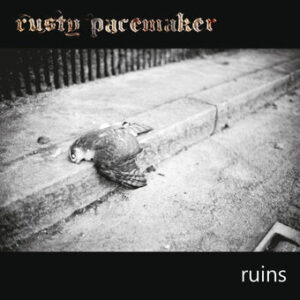Born in Austria in 1974, Rusty Pacemaker has been a lifelong fan of heavy music and turned his hand to the art in 2003. The first glimpse the world had of Rusty’s vision was with ‘Blackness and white light’, an album which saw Rusty working with drummer Franz Lochinger, who returns here for this sophomore effort. The result is the fifty minute, ten track album ‘ruins’, which sets the tone perfectly with its desolate cover art of a dead bird lying helpless on the side of a pavement.
The album opens with the gentle, progressive title track which sees Rusty intoning ‘brick by brick we’re building a ruin, brick by brick a building is ruined, stone by stone we’re falling apart’ over a rippling backdrop that soon gives way to a doom-laden chug. This is dark-hearted music, with a strong grasp of melody and it immediately becomes clear that, in Franz, Rusty has found his perfect foil, the metronomic precision of his drumming perfectly underpinning Rusty’s doomy guitar work and rich vocal melodies. The song builds to a brutal climax, and the latent power that was inherent in the track from the outset becomes explicit as screams slowly fade into the mix and the guitars fizz and burn. Incredibly in these days of musical overload, Rusty Pacemaker still stands apart from the norm and it is difficult to pick out reference points, although Opeth might be regarded as distant cousins. The track makes only one slight miss-step, with Rusty indulging in some dreaded whistling (is there any track where whistling is acceptable? Answers on a postcard please), which spoils the otherwise atmospheric outro, but all is forgiven when we crash headlong into the short, surging ‘made of lies’ which has both melody and power in spades. ‘Ocean of life’ is a longer piece, which opens with the sound of the titular ocean crashing against the shore before the song emerges as a heavy progressive piece complete with female backing vocals and acoustic guitars. It highlights Rusty’s ambition and the piece drifts nicely before the mood is torn apart by the hard driving guitars of ‘the game’, a pulsing hard rock track with metallic elements. Rusty’s vocals, a mix of Burton C Bell’s clean tones and Gary Numan are delivered here with clipped precision, Rusty occasionally breaking into a bark as the music ebbs and flows through some very varied pastures, as he and Franz weave an atmosphere of decay and despair with doomy riffs and Franz’s sublime percussive work.
Seeking refuge in dark progressive realms, ‘night angel’ is a downcast piece of work that employs subtle guitar work and female vocals to seduce the listener. It’s an album highlight, an atmospheric piece that takes its time to evoke an image of slow decay whilst ‘Candlemass’ does a grand job of mining the same rich vein of doom that its namesake crafted with huge ringing chords, dark layers of synth and Franz’s ever-impressive drum work all combining in one perfect moment of gothic-infused doom. Less impressive is ‘forever’, an acoustic ballad that struggles to achieve the grandeur that it should, not least because the vocals are delivered with a staccato intonation that contrasts heavily with the gentle acoustic work. Fortunately it is a short (just a minute or so) piece and ‘matter over mind’ is a fine, heavy piece that sees Rusty back on top form. ‘Knowing’ is an acoustic piece that brings the solo work of Roger Waters to mind, with the lyrics taking precedence over the niceties of melody and it is an interestingly incongruous progressive piece before the album closes with the lengthy ‘pillow of silence’. An epic closer that sees Rusty unleashing some wonderfully chunky power chords as he tears into the song with real vigour.
Overall Rusty Pacemaker’s ‘ruins’ has much to recommend it, but it is also a flawed work. Whilst working as a solo artist can offer advantages in terms of being able to singlehandedly realise a personal vision, it can also reduce the quality control that is the invariable result of band members adding their own unique ideas and input into a piece. Whilst Rusty’s ambition and vision is to be applauded, there are areas where another voice may have contributed some ideas which work better in thought than in deed. The main problem areas centre around the ballads ‘forever’ and ‘knowing’, both of which suffer as a result of Rusty’s unusual intonation, and both would benefit from a softer approach. The heavier tracks, on the other hand, often come out better as the elements seem more in tune with one another and Rusty’s voice is more suited to a more powerful backdrop. With impressive production and musicianship that is generally of a very high standard, fans of the heavier end of progressive rock (or the quieter end of doom) will find much to admire in this unusual and accomplished release, but it is arguable that, at present, Rusty Pacemaker is still finding his sound and it will be left for the next record for him to truly reach the potential that is so often on display here.




